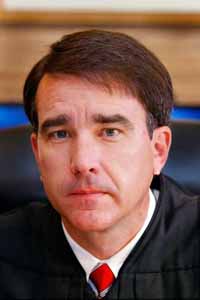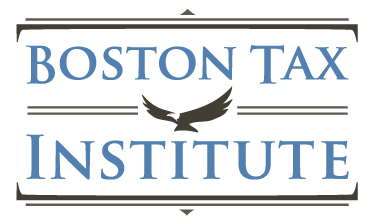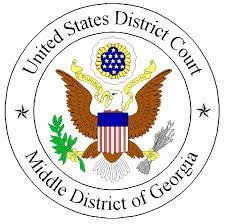On May 13, 2024 an exciting jury trial will commence in the United States Court House in Athens, Georgia. Tony D. Townley, cofounder of Zaxby’s, and Elizabeth A. Townley are suing the United States of America for a tax refund of $43 million based on charitable deductions for conservation easements valued at $166 million. How are easements on 794 acres with basis of $1,277,420, assessed at $1,678,435 worth $166 million? Well gravel has been discovered on the land. Actually there is a regular old gravel rush going on in Georgia, but it is mostly being fought about in Tax Court. This case is different. It is not about a syndicated deal and it is in district court, not Tax Court. And the deduction is quite high. The only case I have found in the same ballpark is Coal Property Holdings, another mining easement deal.
How Are Things Shaping Up?

Clay D Land
\
Judge Clay D. Land last month ruled on multiple motions for summary judgement from both sides. In his introduction he sort of scolded the government:
“From the heated rhetoric flowing from some of the briefing in this case, it is evident that the IRS and its counsel passionately believe that this worthy conservation scheme has been abused by greedy taxpayers assisted by clever lawyers, crafty accountants, and over-zealous appraisers. That rhetoric, some of which rises to the level of hyperbole, is not particularly helpful in focusing on the precise legal issues to be decided in the present case. Quite frankly, when legitimate skepticism evolves into generalized cynicism, such an attitude is typically counterproductive to assisting the Court to objectively evaluate legal requirements on a case-by-case basis.”
We could pick a little nit with that. If the Townleys had not paid the tax and gone to Tax Court that would have been litigating with the IRS and IRS attorneys. In district court they are suing the United States of America facing off against attorneys from the Department of Justice Tax Division. Judge Clayton continues:
“While Congress certainly expected that these types of deductions would be closely scrutinized, it did not intend for the IRS to create “gotcha traps” to ensnare taxpayers who seek the deductions in good faith. An enforcement attitude tempered by an expectation of substantial compliance should prevent abuse while accomplishing the worthy public purpose of conservation easements.”
The Towleys get judgement that they had a valid conservation purpose. They did not get summary judgement on the issue of their continuing timber operations interfering with that purposes. They also win on the appraisals that they submitted were “qualified appraisals”. An appraisal does not have to be right to be qualified.
Valuation is the big issue. Since easements are not bought and sold all that often, the regulations allow an easement to be valued by taking the fair market of the property without the easement and subtracting the fair market value of the property after the easement. Typically the big argument will be about the before value. The preferred valuation method is comparable sales, but it is important to consider the highest and best use of the property, meaning the use that will bring the owner the most money.
The Townley appraisers argue that gravel mining is the highest and best use. Further in their view there are no comparable sales of land with proven reserves since the information is not publicly available. Hence they value the property, in part, by taking the discounted cash flow from mining for the next twenty years. The appraisers for the government do not agree that the gravel mines are economically feasible.
What does Judge Land think about all this? He is leaving it to the jury.
Brilliant Strategy
David Aughty, representing the Townleys, has a great reputation. A 1975 Citadel graduate he won a decision in the Supreme Court, which does not take all that many tax cases. He has become something of an authority in conservation cases. A very knowledgeable attorney who prefers to be off the record wrote me that:
“The strategy to put this case in district court in a refund case where, it appears, a jury will opine on the competing valuations is brilliant. I assume that was David Aughtry. Without knowing all the details, I think the Tax Court probably would have found some reason to sink taxpayer’s claim, either on technical grounds or some other grounds.”
And
“All Townley has to do is to get it to the jury (which the judge seems to be allowing) and the jury will also have some tendency to help the hometown boy. Notwithstanding there, the mega dollars involved may put some of the good old boys on the jury off.”
Going through the motions and depositions I can see some of these issues. There is a motion to exclude exhibits that would support a wealth based bias against the Townleys. That would include mention of the roughly billion dollars that Townley got from Goldman Sachs for his interest in casual restaurant chain Zaxby’s in 2021.
There also seems to be a strong effort to distinguish the Tonwley’s donation from syndicated deals. The Townleys had owned the property for some time rather than having acquired an interest briefly before the easement was donated. They don’t want this case to seem at all like Savannah Shoals where Judge Goeke of the Tax Court allowed only $480,000 of a claimed $23 million deduction for a different Georgia gravel mine.
Lew Taishoff who blogs the Tax Court with incredible intensity also gave me some comments.
“Townley is a local good ol’ boy who cares about The Home Place, and made good selling fried chicken to the locals, not some hedgefund sharpie who made a pile swindling the home folks.
And if he gets a jury, the odds are 99-to-one none of them will begin to understand what the experts are talking about. If lawyers can’t add, and judges won’t add, juries are even less numerate. Mention tax law, and you might as well be talking about Cabbalah or astrophysics.
Remember, USDCJs aren’t tax specialists. I doubt one in fifty does her/his own tax return, much less has ever done anyone else’s.”
Reflection
Recent legislation has significantly reigned in the syndication of easement deductions. That legislation has no effect on transactions such as this one. Highly paid professionals won’t be able to pay taxes on their bonuses for fifty cents on the dollar through buying into an easement partnership at year end anymore. Something tells me that the people who dreamed up that technique will be offering something new.
Still, someone with deep pockets and patience might be able to effectively buy their mountain retreat for free if there is enough gravel down there. Although not ideal, the solution might be something like the Low Income Housing Tax Credit where the tax benefit is apportioned to state agencies which award it to individual projects. In the meantime I will be anxiously awaiting the verdict in this case.
For great value continuing professional education. I recommend the Boston Tax Institute

You can register on-line or reach them by phone (561) 268-2269 or email vc@bostontaxinstitute.com. Mention Your Tax Matters Partner if you contact them.
Originally published on Forbes.com.
For articles oriented toward tax professionals check out Think Outside The Tax Box.
My new book Reilly’s Laws of Tax Planning is now available from TOTB.
































































































